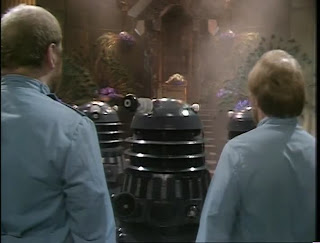Companion: Jo Grant
Written by: Guy Leopold (aka Robert Sloman and Barry Letts)
Directed by: Christopher Barry
Background & Significance: It feels like we've been talking about The Master season a lot lately. You know the one. It's season eight. Pertwee's second season. The one in which The Master appears in every bloody story. I don't think that's far off. I mean, two of the last three Pertwee stories for the blog have been season eight. I just watched "Terror of the Autons" for the first time back in January. And "Claws of Axos" was a fairly recent story we covered on the podcast a few weeks back.
But "The Daemons". Yes. The season finale to this Master season. And it's the one in which "The Master Problem" is solved "once and for all" until we get to the next appearance by him later. Regardless, it is the closing of a book of Master stories, I suppose. And it's fitting that it's a story co-written by the era's producer Barry Letts and the other half of that co-writing team is something of a "regular appearance" for the era, in that Letts's co-writer Robert Sloman would be the co-writer for the rest of the Pertwee season finales. It's one of the things I like about the Pertwee era. You can always count on a story in each season to be written by Malcolm Hulke. And once you hit the "UNIT family" stuff you can always count on a season finale written by Sloman and Letts and for that season finale to USUALLY be a good thing. (There is the one glaring exception, though).
To ring out the season, Letts (and Sloman because he was involved) decided to explore a specific paganistic and black magic iconography they hadn't yet seen in Doctor Who.
As such, and because it's widely considered such an iconic story for both the era and The Master, it has been celebrated up and down the halls of Doctor Who fandom as one of "the great Master stories". While my initial watch of the story is hard-pressed to disagree, I think I'm most interested to see how it pans out on a repeat viewing and when I'm taking it apart and all that. It'll also be especially interesting to see the directorial style of Christopher Barry, who is something of a hit-and-miss director as far as I'm concerned. But yes. We will see.
So let's get to it!

































